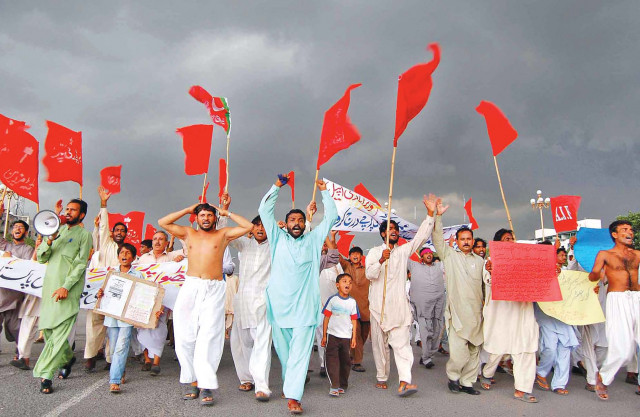Dozens of brick-kiln labourers take to streets
Dozens of labourers, forced to work in brick kilns, took to the streets on Friday afternoon in Islamabad.

Dozens of brick-kiln labourers take to streets
Inayatullah, President of All Pakistan Bhatta Labour Union, and Farzana Bari, a prominent social activist of Awami Jamhoori Forum, led the group.
Labour representatives delivered speeches to the protestors, condemning the “barbaric conduct” of brick-kiln owners towards their workers. They called for immediate implementation of The Bonded Labor (Abolition) Act 1992, which is a special law that prohibits all forms of advances resulting in bonded labour.
The speakers demanded the Ministry of Labour and Manpower to register brick kilns and issue social security cards to labourers working in these setups. They said that the minimum wage, fixed at Rs517 for every 1000 bricks by Punjab Minimum Wage Board, should be immediately implemented.
Inayatullah said, “Not much has changed for us labourers who have gained freedom from bondage. There are only 5,965 freed bonded labourers and they too are living under miserable conditions in the Sikandarabad Hari camp, Baba Saladin Hari camp and Azadnagar Hari camp.”
Bari in her speech condemned the government’s failure to implement the Bonded Labour System (Abolition) Act 1992. She added, “The government has failed to do anything for thousands of bonded labourers despite Supreme Court’s order in 2008 to liberate them. The few that have been freed suffer due to lack of proper rehabilitation strategies. “
Sparc, a local NGO, estimates that there are at least 1.7 million bonded labourers all over Pakistan, with most of them languishing in southern Sindh and Punjab. These people work in miserable conditions on farms and in brick kilns.
This figure does not include the large number of bonded labourers working in carpet weaving, mining and other industries.
Bari added that the
brick kiln industry was notorious for the system of bonded labour, where the
workers were exploited economically and their rights to mobility, education, freedom of expression and physical integrity were frequently violated.
Inayatullah concluded, “There are no medical facilities for us to go to in case of emergencies. Our children work in factories and break stones. Even a bath is a luxury for us.”
Published in The Express Tribune, September 18th, 2010.
She said that before this NUSPA had arranged the Young Leaders Conference in 2010 in Pakistan, to develop and strengthened leadership qualities among the youth of Pakistan.
“Pakistan is flooded with talent; all that is lacking is a platform to develop it,” she said.
Fatima said that interactive sessions will help broaden the vision of Pakistan’s students from all back grounds and motivate them to think about their country in unity.
She said that members would get a chance to study abroad for free. She added that during this campaign funds for the flood victims would also be collected.
Published in The Express Tribune, September 18th, 2010.



















COMMENTS
Comments are moderated and generally will be posted if they are on-topic and not abusive.
For more information, please see our Comments FAQ